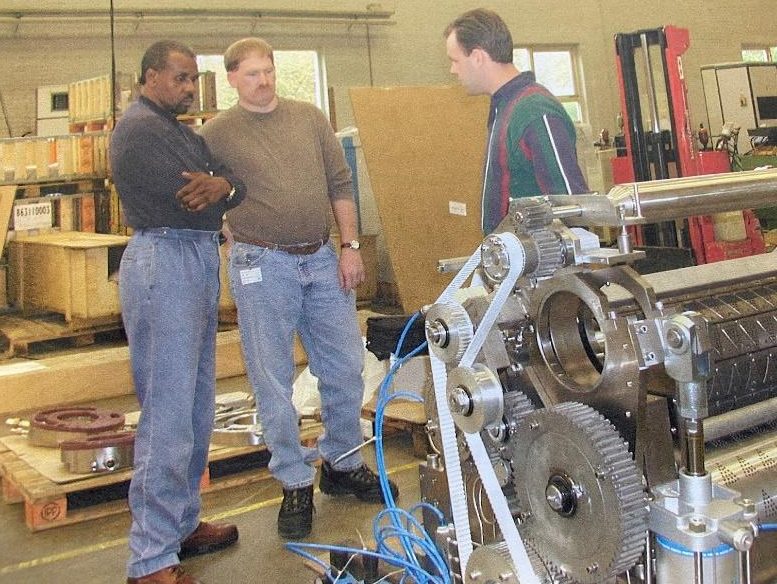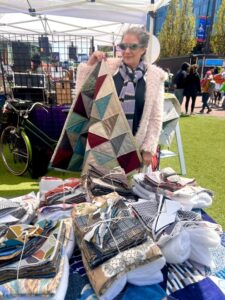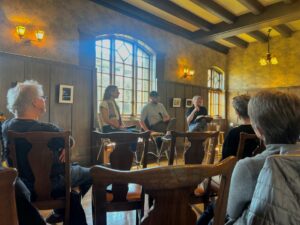From a man who triumphed over homelessness to a woman reminiscing about the one who got away, 12 everyday people shared their stories with students in Betsy Edgerton’s Introduction to Journalism class at Columbia College Chicago. In their own words, here are their stories. All interviews have been edited for clarity.
—
“The ability to create things that I see in my head and make them real, it’s a really fulfilling feeling. It keeps me going. It’s the reason I get out of bed and do things in the morning.
For the longest time, I’ve made things. I’ve made earrings, I’ve made keychains — I’ve just made things. I like to give them to people. A couple years back, I had given people stuff and they were like, ‘Can you make me, like, a custom order? I’ll pay you.’
I never realized that I could get paid for doing things I like. I started slow with social media and sold locally. A couple years later, I now have a Depop.
I doubt myself constantly. Creative outcomes vary all the time. I mean, if I have an idea for a piece, I’ll be like, ‘can I actually do that? Would someone actually want that? Would that look good?’ I doubt if I should even be doing this in the first place. But you know, there’s always going to be doubt.
Trial and error are amazing, even though it’s frustrating. It’s not always going to go exactly the way you want it. After a couple bumps in the road, trials and tribulations, it’ll all be figured out at some point. You learn from failure. It’s difficult to realize that, because failure sucks, but it’s something that I’ve learned to deal with.”
— Ab Nicolay, 19, Des Plaines interviewed by Madison Blancas.

“I had developed threat-casting, which is looking at a future of potential threats. I was approached when I was at the Intel Corporation by the United States Air Force, to come to the Air Force Academy and teach how to do threat-casting. I taught many cohorts of people to be futurists, and I wanted to do more in academia. I was then appointed a professor at Arizona State University. There I have a threat-casting lab, where we do sponsored research, looking at potential threats to national and global security. We do it with NATO. We do it with the United States Secret Service.
The most important thing is being a professor because of the students. On my first day, being a professor, I stood in front of my class, and said, ‘You are smarter than I am. If you look across the room, intelligence-wise, at what you will accomplish, you’re smarter than I am.’ I told them, ‘You’re going to rewrite the syllabus and tell me what you want to learn,’ and their minds were blown. That’s what I always say to all my students: ‘Can I help you understand this?’ I tell people the first step is to ask yourself, ‘What’s the future you want? Who is the future you?’ ”
— Brian David Johnson, 51, of Portland, Oregon interview by Eleanor Lusciatti.
—
“The most interesting thing about Bronzeville is the history we hold. We are a community with a soul, where you can feel the vibration of the past and visions of the future. Bronzeville is known for its historic significance, especially the Bronzeville Walk of Fame on King Drive, honoring influential African-Americans that have had many great accomplishments. Our sense of community is unlike anything you have seen before. We have block parties, local jazz nights and a strong network of organizations focused on education and youth development. It’s a neighborhood that takes care of its own and looks out for one another, especially our children. They’re the future.
Safety is a big concern in our neighborhood, particularly in certain areas and blocks. We have to worry about the rise in gun violence in our youth. We’ve also faced some challenges with the preservation of our history and the historic value in our community, but we’re actively working to address these issues. We have seen a kind of renaissance in recent years with remodeled storefronts and new housing developments. It is becoming a destination for the arts and culture, drawing in a diverse mix of people into the community.
Up and down King Drive you will see wonders of food and Black-owned clothing boutiques. My favorite spot to go for a quick meal is Maggie’s on 47th Street, right next to the Green Line. And we have a few soul food restaurants that are good to eat at. They capture the beauty of our neighborhood’s food history. I see a bright future for us. With continued remodeling of stores and new housing designs with a focus on preserving our history and teaching young talent, our community will remain a beautiful place to call home.”
— Michael Lister, 56, of the Bronzeville neighborhood of Chicago interviewed by Rico Mays.
—
“First responders – if you look anywhere – it’s a family, multigenerational thing. [My son Bill] was a Boy Scout for quite a while, so he got interested in first aid there. He joined the first aid squad as a cadet at 15 or 16. I don’t totally know what his motives were, but he became a nurse. [My son David] had always been around it with me, but he wouldn’t join until after I was chief. He joined the fire company then and he became a lieutenant, which is the first officer position.
And then [for my son Mike], there was the pipeline explosion. We pressed Mike into service that night, because they put all kinds of people over in the Catholic Youth Organization Hall and they didn’t have a fire watch. So, we gave Mike a coat and fire extinguisher. Have you ever watched ‘Animal House’ and the guy is standing in the street, telling everybody to halt and they run right over him? That’s what Mike looked like at the CYO Hall. He then joined the fire department.
If you look at the ranks of the fire department, when I joined, every name was repeated on the roster two or three times by family members. You’re doing good for people who are really in a bad way. There’s not a lot of people that want to do it.”
— William Russell, 82, of Metuchen, New Jersey interviewed by Bronwyn Russell.
—
“It was tough out there during that period. You never know how bad it is being homeless until you yourself go through that. I had a decent enough job, a house. And just like that it was taken away from me. I thought soon enough I’d get back on my feet, but it didn’t happen like that. Those five-and-a-half months were hell for me. I had no one to go to. It was just up to me to make things happen. I felt invisible out there. A couple people would help you out, but the majority would just ignore you. What saved me was going back to my faith. When everything first went down, I kind of looked to God and asked, ‘Why?’ I lost hope and faith for a while. But one day I just started to pray. And God answered my prayers.
I’ve been lucky enough to get stable work and housing again. I’m just really so happy to be back in a good spot in my life. And every day I make sure to let people know that God loves them. My situation taught me to never lose faith. And I want to make sure that other people know when things become a little shaky, that God is there for them.”
— Sal Melendez, 41, of Chicago interviewed by Noah Johnson.

“It was the late ‘90s. I was an engineer for Procter & Gamble, and at that time they made Pringles. Procter & Gamble decided that they wanted a similar product that was a corn chip shaped like a triangle and in a triangular can. I had been an engineer for Pringles, so I had a certain skill set that when Procter & Gamble decided to try and innovate this new product, I was on.
I got to be involved in consumer project research. So, I got to sit behind a two-way mirror and watch people eat different kinds of chips and products. I got coached on how to be careful, like in the airport, in public spaces, out at dinner, that someone could be looking over my shoulder watching what I was doing.
When you ate these chips off the line when they were still hot and still wet with cooking oil, it was like eating fresh bread that just came out of the oven. They were just fantastic. They were way better than Pringles. And then Procter & Gamble decided to pull Torengos off the store shelves.”
— Rusty Herring, 52, of Reynoldsburg, Ohio interviewed by Maya Stokes.
—
“The turning point in my career has been becoming an executive chef because here I get to not only teach how to cook, but also to mentor young talented people like me in the past. Food to me is just like breathing, meaning, it just comes hand in hand with a part of life. But it’s also a talent, you know? It’s like being a NASCAR driver; you can’t just roll out of bed and win the Cup. It is what it is.
You have two choices: you can either cook at home, or you can cook for an industry. It’s not the same, and it’s not easy. You give up a lot definitely at the beginning. What do you give up? You give up family, you give up your personal time, your friends and, when I first started off, the money was not good, but, hey, if you stick along long enough, you’ll make some money. It’s not for everyone. It’s a lot of sacrifices. So, my advice to any upcoming culinarians is, if you’re going to do it, be passionate about it. If you’re going to do it, you have to wait. You have to wait for good things to come, and good things will come if you work hard for it.”
— Sherman Scott, 53, of Alabama interviewed by Sam Mosquera.

“I can’t really remember life before my children. It felt like my life began because my world opened into a dimension of another human life, and I was completely involved, invested. So, when they diagnosed [my sons with autism], it was sudden news that life might look a lot different for my children than I thought it would look for them. But my childhood was anything but normal, so I thought, ‘I’m prepared for this! I can do this, let’s see what it is we are dealing with and then find the tools.’ People would feel bad. Back then there wasn’t an awareness with autism. But I was energized and welcomed into a whole new world that expanded me.
I’ve had so many new things to explore that I never would’ve. It would never have occurred to me to delve into neuroscience the way I did. I started to understand that everyone is kind of on the spectrum, it’s just the degree to which it affects your life. There is not enough time in my lifetime to learn all that I could, but I’m astronomically blessed with experience and information and perspective because of it. I just want to make a safe place for my children to be who they are without feeling like they have to hide. Giving them experiences so they aren’t tunnel-visioned, celebrating all the small things. That’s my philosophy: limitless thinking.”
— Anitra Coulter, 49, of Leander, Texas interviewed by Kaitlyn Mahan.

“I spent my last summer in high school at the Governor’s School for Science and Technology in Virginia and my study was in aquatic biology. It was a big change. I grew up in a very Christian environment. My parents were heavily involved in church, and so much of my time and extracurricular activity orbited around those sorts of expressions. But now I was just completely on my own and there was this impression that science and faith are enemies and that they live in tension with one another, but I’ve found that they can live in harmony in my experience at the Governor’s School.
However, there were a few students who had that attitude and seemed to have made it their mission to kind of identify anybody who was a person of faith and try to explain to them why their faith, such as mine, was just a product of my parents. My faith was durable at this time, but this had turned it resilient. This was extremely difficult at first but eventually, I became very grateful for it. I had to learn to engage with others of different philosophies without pushing my identity on them, but also knowing that my faith means more to me than anything and not losing that.”
— Chris Gillott, 44, of Clearfield, Pennsylvania interviewed by Lilia Labertew.
—
“My first official job was working over the summer for the Chicago Park District at a high school, scraping gum from under desks, but that was just for the summer. I feel as if my first real job was at the Finish Line during my senior year. Now I’m an accountant. I learned my love of numbers back when I was an accountant at Finish Line and realized I was good with numbers in school. So, I went to school, got a degree in accounting, and now I have been working in accounting since I graduated from college. It’s always been accounting; I was a senior staff accountant, accounting manager and now I’m a controller. I pretty much stayed in the same kind of area, which a lot of people don’t do these days, but it just worked out.”
“When I first graduated high school, it was during the recession and it was hard to get a job. Luckily, I interned and was able to go back to my internship and make a little money after graduation, but it took eight months to find a job. So, luckily, I developed that relationship, and I was able to go back to my manager from that internship and say, ‘I graduated but I don’t have a job.’ It was a challenge, but because I developed that relationship and kept it going throughout college, she offered me to come back and work until I found a more permanent position.”
— Keshia Anderson, 40, of Bellwood, Illinois interviewed by TeKavin Russell.
—
“I just knew then. We just stood, and he had his arm around me, and I don’t know, I just felt like at that moment I could just be there with him forever. He had blond hair and blue eyes. And his personality. He was just so funny. I just felt a deeper connection to him than I had previous guys. I hadn’t dated a ton as a teenager.
When we’re looking for that special someone, we have our little list, and so he checks a lot of boxes. When we first met, we were in church and became friends. We dated for a while. And then he asked me to marry him. He handed me a flower, and he put the ring around the rose. When I looked at the box, that really took my breath away.
We were set to marry, but then things just kind of didn’t work out. There were just various conflicts. Believe it or not, I mean, we went to church together and had the same beliefs, but we still disagreed on things. Looking back, I went more on emotion than I did true love. If I would have married him, we would not be together now. We would be divorced.”
— Tracy Stevens, 53, of Carlisle, Ohio interviewed by Claire Gerald.
—
“I moved to Los Angeles in June 1984; I was 23. I moved because I grew up playing sports and once I stopped playing competitively, I was bored, fell into a rut, needed a change. My then girlfriend, now wife, Marie, was feeling the same way. California was great to live in when I was young and in my 20s –beach, mountains. But it’s very busy, a bit of a rat race. I learned my trade out in California, which I’m still doing to this day. I got married, bought my first house and had my first kid, Brock. I moved back because we didn’t want to raise Brock out in California and wanted to get back closer to family. After 13 years, it was time to come back home to the Midwest.”
— Kevin Johnson, 62, of Rockford, Illinois interviewed by Aidan Johnson.







Be First to Comment